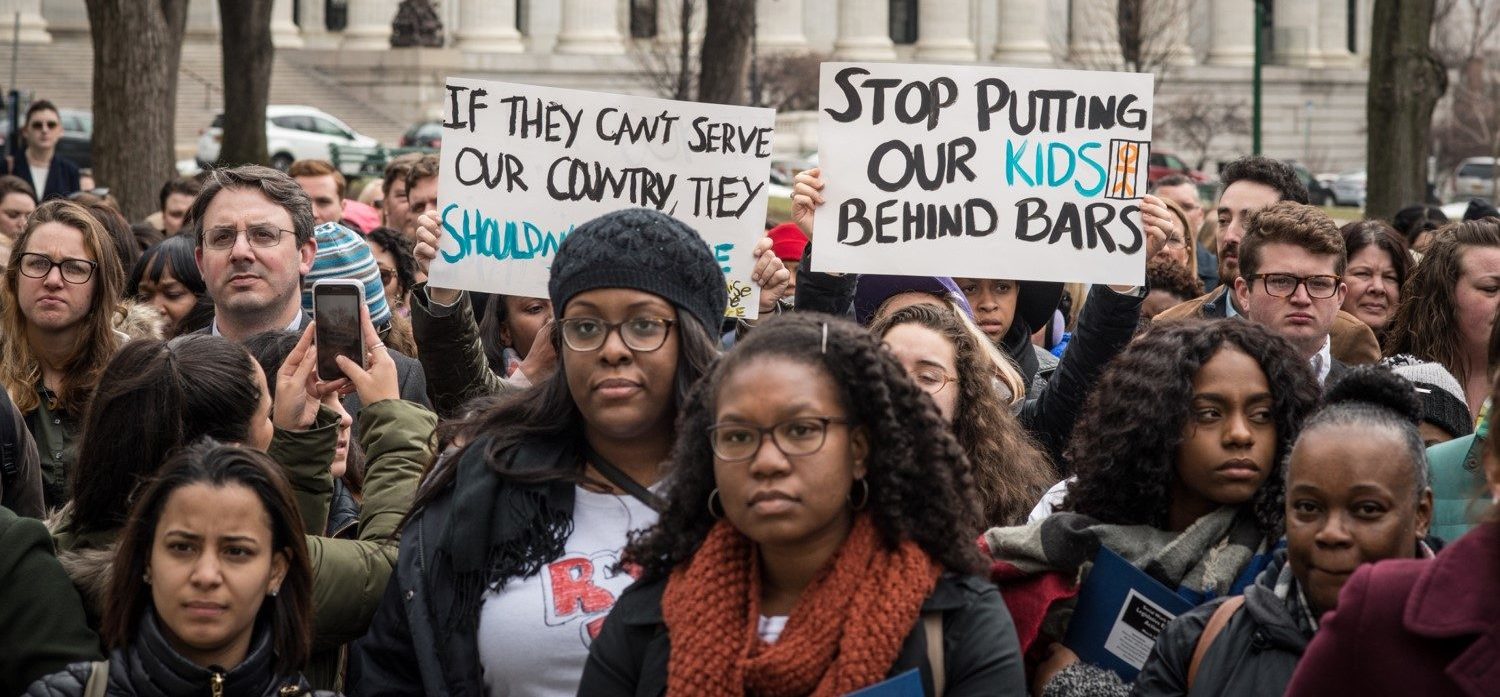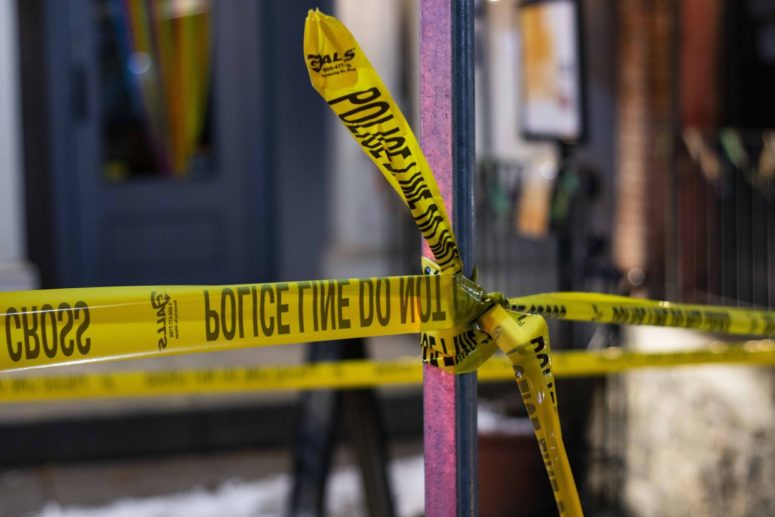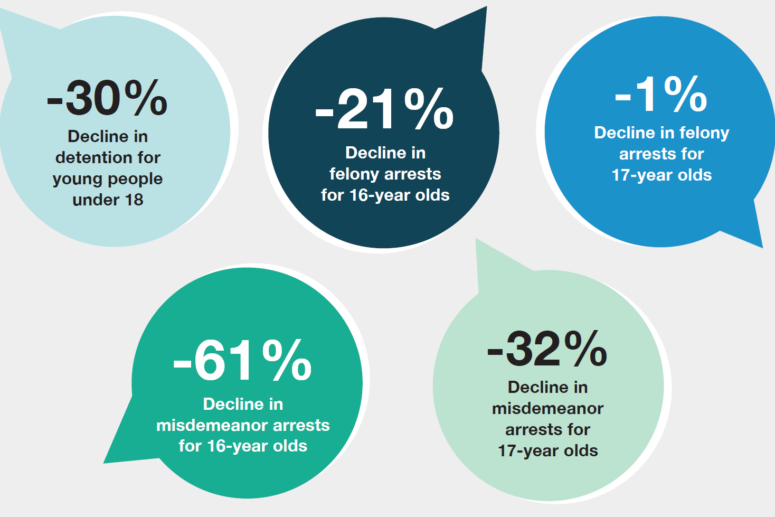October 1, 2019 – Today marks the first day that 17-year-olds are covered by New York’s landmark Raise the Age Law, reflecting the final phase of implementation. Over the last year, we have seen the ground-breaking work of hundreds of diverse individuals and organizations from across New York State, including formerly incarcerated youth and their families, child advocates, service providers, faith leaders, legal services groups, officials, administrators, and unions, become a reality.
Raise the Age has helped New York continue to shrink its youth justice system and serve more youth through the family courts, instead of the adult criminal justice system. Since last October, statewide felony arrests among sixteen-year-olds have decreased by more than a third. Most sixteen-year-olds are having their cases proceed in Family Court. This includes misdemeanor-charged sixteen-year-olds, and 82% of all felony-charged sixteen-year-olds arraigned in the new Youth Part of criminal court. Raise the Age is good policy, for our young people, communities and public safety.
As of today:
• When 16- and 17-year-olds are arrested, their parents must be notified.
• When police question a 16 or 17-year-old, it must take place in an age-appropriate setting, with parental involvement, and for limited, developmentally-appropriate periods of time.
• All 16- and 17-year-olds charged with a misdemeanor (other than vehicular and traffic misdemeanors) have their cases heard in Family Court instead of adult Criminal Court, and will not be exposed to a permanent criminal record.
• 16- and 17-year-olds charged with a felony have their cases heard first in the new Youth Part of the adult Criminal Court. Most felonies (other than the most serious) will transfer to the Family Court within a few weeks, unless the court finds there are “extraordinary circumstances.” In Family Court, cases may be diverted out of the court system, and the youth charged will not have permanent criminal record.
• 16- and 17-year-olds charged with allegedly displaying a deadly weapon, causing “significant injury,” or engaging in unlawful sexual conduct, will remain in the Youth Part of Criminal Court, unless the prosecutor consents to remove the case to Family Court.
• 16- and 17-year-olds in the Youth Part have their cases heard before a judge trained in adolescent development and family law.
• 16- and 17-year-olds are no longer housed in jails with adults.
These are significant strides, but our work is not complete. In the coming year we will be fighting to:
End the Use of Solitary Confinement in Adolescent Offender Facilities
Experts in mental health and corrections have rejected isolation, solitary confinement and lengthy periods of in cell segregation as a response to adolescent behavior in facilities. Despite this, current practice in Raise the Age Adolescent Offender Facilities for sentenced youth permits children to be held in isolation for up to 18 hours a day. Because brain development is underway, adolescents are particularly vulnerable to the negative effects of solitary confinement, including increased risk for: aggravated mental illness or deteriorated mental condition, anxiety, insomnia, self-mutilation, suicidal thoughts, and suicide. We must end this practice in facilities for sentenced youth.
Stop the Criminalization of Childhood by Ending Prosecution of Children Under 12
Under current law, children as young as 7 years old may be arrested and prosecuted as juvenile delinquents in Family Court. Only North Carolina has a younger jurisdictional age, setting the bar at age 6. Children under 12 may be subject to police questioning, pre-trial detention with older youth, probation, and mandatory confinement. By raising the age from age 7 to 12 we can better serve elementary age children who come to the attention of law enforcement through community-based services, including those available through our local departments of social services and behavioral health care.
Strengthen and Expand Protections for Court Involved Youth Up to Age 25
New York’s Youthful Offender (“YO”) law provides the opportunity for youth under the age of 19 to have a criminal conviction set aside and replaced with a confidential, non-criminal outcome. It also allows for reduced prison sentences. Yet, at age 19, this critical protection is no longer available, exposing young people to mandatory prison sentences and lifelong criminal records that create barriers to education, jobs, and housing for youthful mistakes. New York must strengthen existing protections under the youthful offender law and create a new “Young Adult Status” covering young adults up to age 25. We should also ensure that young people convicted before reforms go into effect benefit from criminal record sealing.
End the Adult Incarceration of Youth
Young people who are sentenced to a term of incarceration require developmentally-appropriate settings and supports. But, under Raise the Age, adolescents sentenced to a state prison term are sent to Adolescent Offender Facilities, which are operated by the Department of Corrections and Community Supervision (DOCCS). The Office of Children and Family Services (OCFS) has administered secure facilities for similarly-aged youth charged with serious crimes and has a track record of delivering age-appropriate services in those settings. Adolescent offenders should be sentenced to secure OCFS facilities and we must end the practice of sending sentenced youth to facilities administered by an adult prison system.


